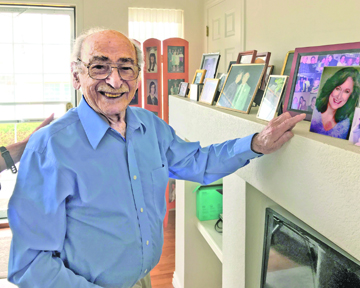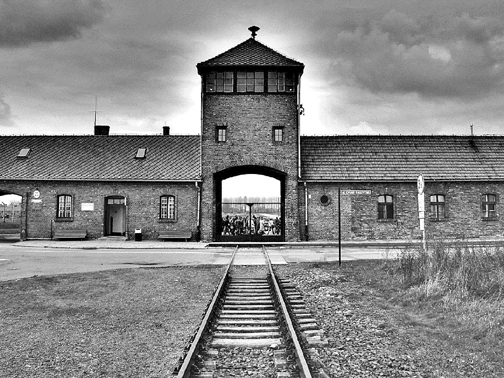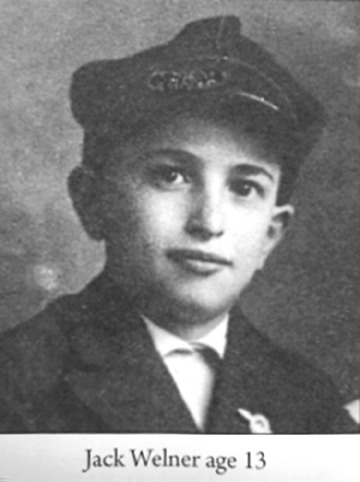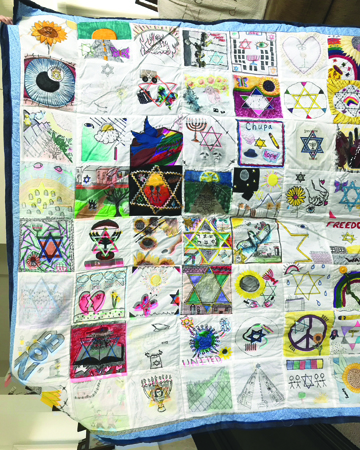Holocaust Survivor Shares Memories And Advice
by Ruthy Wexler

At 98, Jack Welner’s face shines with the eager ebullience of a 6-year-old. His eyes twinkle with fun. That’s the kind of boy Welner was back in Lodz, Poland — helpful, fun-loving, excited about life — and by all accounts, that’s the kind of man he became. In between, however, came the Holocaust, and — because Welner is Jewish — unimaginable suffering.
Through Auschwitz, Dachau, labor camps, a death march — how, people ask, did you stay the same person? Looking back over the years, Welner explains how he kept bitterness out of his heart and held onto the twinkle in his eye.
Take This, You’ll Need It

It’s not that Welner forgot what happened. He shares memories so vivid, you are there: watching how fast the Germans turn a corner of Lodz into a barbed wire ghetto; seeing guards shoot Jews in the ghetto streets “just for practice”; pretending — along with the seven other family members crammed into one room with no toilet or running water — that the beet leaves your mother salted and fried taste just like herring.
“We were starving [in the ghetto],” recalls Welner. “Just before we got on the train [for Auschwitz], we got a little piece of bread. Late that night, we arrived. I helped mother down from the train. She still had her bread. She pushed it into my hand. ‘Here. Take this. You’ll need it.’”
Welner’s eyes fill with tears. “Those were the last words my mother said to me.”
Look For Luck
After the war, when Welner was in a safer place — Denver, CO! — and heard “even a little bit of antisemitism” he’d speak up. “I left Poland to get rid of SOBs like you, so you better shut up.”
“Later,” he adds, “we’d become friends.”

But back when hatred of Jews was law, Welner searched for small ways to survive. In a labor camp near Dachau, a guard kept beating Welner with a 2×4 so brutally, “I knew I would die if he kept it up … so I sank to the ground and began crying. Not so much from pain, but I had to … do something.”
Welner adds emphatically: “In my mind, I was saying, ‘I will survive you, you SOB!’”
Later on in that camp, “… my luck changed. A machine operator took a liking to me. I was suffering from an ulcer. He let me lie down. He brought me rinds of bread to eat.
“He saved my life,” concludes Welner, who, after the war, traveled twice to Munich to bring food to that guard.
Welner was still able to feel empathy.
Many had lost that capacity.
“I had a cousin, blonde, she survived by working as a maid in a Warsaw hotel, disguised as a Christian,” Welner recalls. “When the [Warsaw] ghetto was burning, someone laughed, ‘Look, the bedbugs are frying.’ Her family was inside that ghetto and she had to stand there, crying, saying nothing …”
Welner shakes his head. He tells how, upon arriving back in Lodz after being liberated, the first words he heard from a Christian were, “Oh, a lot of you Jews are still alive.”
L’Chaim (To Life)
Welner shares such memories seriously, like one delivering a valuable package. Now one more person knows and will not forget. But he is not inclined to dwell on or analyze the horror. Asked about antisemitism, Welner shrugs. “That’s how it was. Always the Jew was the scapegoat.”
When the subject turns, however, to his three children, six grandchildren and four great-grandchildren, Welner’s face lights up like a 100-candle birthday cake. He enthuses at length about each one. It glows when he converses about travel or music. And when he sings.
Welner loves to sing.

“I love Italian,” he rhapsodizes. “I still remember songs from Italy [where he was in a DP camp].”
In the ghetto, Welner recalls, there was a Jewish composer who wrote satiric songs. Welner sings one in Yiddish, then translates: “Such a disaster, you have to eat every day, the stomach always wants more and more…
“We needed to laugh,” he recalls.
Welner adores jokes. Laughing uproariously (but never ruining the punch line), Welner tells a joke about the cow from Minsk. The farmer and the bull. The one where two friends enter a bakery: “‘Moishe, look at that wonderful bagel!’ ‘Oh, but it’s got a big hole in the middle!”’
Optimist
“I see the bagel, not the hole,” Welner explains. “I’m an optimist.”
At 31, Welner anticipated a happy future when he met a beautiful girl, Adele. They married and moved to Denver. Seven years later, Adele died, leaving Welner with three small children and a broken heart.
Welner moved to Israel for five years to be near his sisters, then back to Denver, where he worked as a carpenter and raised his kids. Despite the disappointment of a subsequent marriage not working out, “My father always enjoyed life,” recalls Welner’s daughter Beverly. “Our home was filled with love and laughter.”
As a Holocaust Survivor, Welner spoke to schools and groups in Denver and surrounding areas. Then in 1995, the Shoah Foundation sent Lori Goldberg to interview Welner.
The two connected.
“We became best friends, sharing life’s joys and challenges,” says Goldberg, who, coincidentally, in the first years of their relationship, saw Welner on Tuesdays.
“He was my Morrie,” she says, alluding to the book, Tuesdays with Morrie. “From Jack, I learned about courage, resiliency, hope, and love.”
My Motto
“Jack has taught me, no matter how difficult life can be, one should never give up hope, one should never stop loving,” said Goldberg.
“My motto,” Welner says, “is, ‘Don’t let the past ruin your future. If you live in the past, you don’t have a future.’”
“I receive so much more from Jack than I could ever give,” says Welner’s caregiver, Linda Chambers. “It is an honor to know him. He will not allow hate to grow in his heart.”
